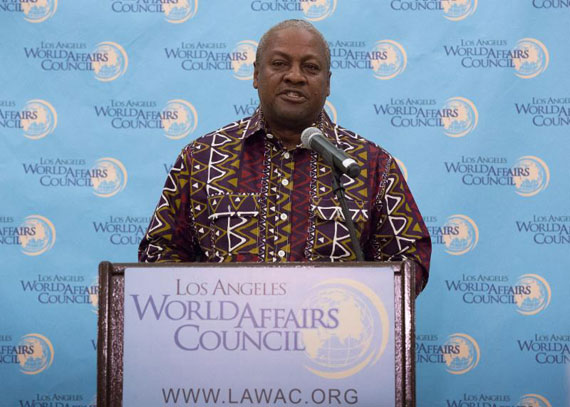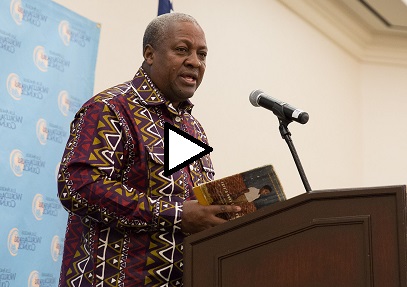 His Excellency John Dramani Mahama, President of the Republic of Ghana, speaking at the Council
His Excellency John Dramani Mahama, President of the Republic of Ghana, speaking at the Council"I'm here to talk about Ghana's rise," said President of Ghana John Mahama to the Los Angeles World Affairs Council on Thursday, October 1st. "To your ears that might sound like a simple 15 minute speech," he said. "To my ears it's like being asked to provide a detailed synopsis of war and peace...I say this to be a bit cheeky." Unlike many of his neighboring countries who for long stretches of time have been engaged in civil war, Ghana has never experienced civil war - though there were periods of time when it appeared that, as Mahama said, "We were at war with our own purpose." He said that "in many ways it is easier to understand and appreciate Ghana's rise, if you know its fall."
In 1957, Ghana was the first sub-Saharan African nation to gain independence from European colonial rulers. "In those days," said Mahama, "Ghana blazed a trail for Africa and for those of African descent on the continent." At the time, Mahama's father was a Minister of State under President Kwame Nkrumah and it was because of that connection to government that Mahama credits the path to his presidency. "My personal life and the life of Ghana became intertwined," said Mahama, "and shaped my life into what it is today."
Mahama started by recalling the political upheavals in Ghana in the 1980's, and reading excerpts from his book My First Coup D'Etat. "Before I tell you how good it is now, I want to tell you how bad it once was," Mahama said. "The average Ghanaian was fighting just to survive." The instability and the "state of anarchy" in Ghana triggered "brutal and inhumane" acts of barbarism." He talked about a specific group of soldiers known as the "Seven Gladiators" who drove around in a Pinzgauer, or military utility vehicle, terrorizing people. "The very sight of them was enough to make your heart stop," Mahama said. He told the horrifying story of the night he was stopped on the street with a group of students and, as a "small punishment" for doing nothing wrong, they were all hit hard over the head with the butt of the soldiers' rifles. "It was sadistic," said Mahama.
"And so Ghana is rising from that place....and it is from there," said Mahama, "I have respect for human rights, the rule of law, democracy, good governance, free speech, independent media, and independence." Mahama said Ghana has had positive economic growth for the past two decades, the country is the most stable and secure in Africa, and the growing middle class has increasing disposable incomes. In 2011 (at 13%) Ghana was the fastest growing economy in the world, owing to a GDP rebasement. While Ghana's growth has recently slowed, Mahama talked about the country's many opportunities - it is the second largest exporter of cocoa and is one of the top ten exporters of gold in the world. The oil and gas industry is growing and "we're looking to use that gas to produce more electric power," he said. "Six African economies are the fastest growing in the world today," said Mahama. "That shows that if people are given the opportunity and given the freedom to express themselves, creativity and innovation comes into play and it helps the countries to progress."
When asked about Boko Haram, the Islamic extremists in northern Nigeria most infamous for their kidnapping of schoolgirls in 2014, Mahama said there is now a multi-national task force which partners Nigeria with neighbors Chad, Niger, Cameroon and Benin. "Over the last several months, I think they have waged a very strong counter resistance to Boko Haram," said Mahama. "The fight is still on," he said, "and it's not a fight for one country, it's a fight for humanity."
When asked about the power crisis and frequent outages in Ghana, Mahama said he takes responsibility and explained that with the country's growing population - from 4 million after independence to 25 million - and rapid economic development, they haven't been able to meet demand that is growing at an estimated 10-12% a year. He referred to the slang term coined for the frequent outages - 'dumsor' in the local Twi language, meaning 'off' and 'on' respectively. "When they refer to 'Mr. Dumsor', they are referring to me," he said adding that Ghanaians have a sense of humor. Mahama created a Ministry for Power in November and the government aims to boost generation capacity from 2,300 megawatts now to 5,000 megawatts by 2017.
This year many countries are holding elections - Togo, Guinea, Cote d'Ivoire, and Nigeria for the first time transferred power from one party to another. "Next year my own country is having elections and I'm standing for re-election," said Mahama with his two sons sitting in the audience. "If it is the wish of the people of Ghana that I continue as president then I'll get another term," he said. "If not, I'll just ride off into the sunset."

